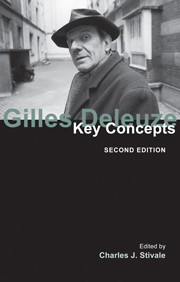Book contents
- Frontmatter
- Contents
- Contributors
- Acknowledgements
- Abbreviations
- Introduction: Gilles Deleuze, a life in friendship
- PART I PHILOSOPHIES
- PART II ENCOUNTERS
- 5 Sense, series
- 6 Event
- 7 Assemblage
- 8 Micropolitics
- 9 Becoming-woman
- 10 The minor
- 11 Style, stutter
- 12 The logic of sensation
- 13 Cinema
- Part III FOLDS
- Chronology
- Bibliography
- Index
8 - Micropolitics
from PART II - ENCOUNTERS
- Frontmatter
- Contents
- Contributors
- Acknowledgements
- Abbreviations
- Introduction: Gilles Deleuze, a life in friendship
- PART I PHILOSOPHIES
- PART II ENCOUNTERS
- 5 Sense, series
- 6 Event
- 7 Assemblage
- 8 Micropolitics
- 9 Becoming-woman
- 10 The minor
- 11 Style, stutter
- 12 The logic of sensation
- 13 Cinema
- Part III FOLDS
- Chronology
- Bibliography
- Index
Summary
But where do doctrines come from, if not from wounds and vital aphorisms which, with their charge of exemplary provocation, are so many speculative anecdotes?
(LS: 148)Exemplary provocation
Tuesday morning. My “Introduction to Women's Studies” class. A perpetually politicized space. Roughly 100 blank or hostile faces. Mostly white, mostly women, mostly middle-class. This week's topic: “Genderbased Violence”. After reading the article “Keeping Women in Our Place: Violence at Canadian Universities” (Harris 1999), students must complete an anonymous assignment: “Honestly and thoroughly describe the ways in which gender-based harassment has affected your life”. Each of them will put their typed report in an envelope, and take another's out. And read it. And “respond” to it, even if just to sign their name.
Thursday morning. Completed assignments, including my own, go into an envelope. I have told the class that I will do this exercise too, since gender-violence carves itself into my life, and the lives of people I know and love. And the work that I do which I call feminism is not incidentally related to that carving. Each of us draws out an innocentlooking sheet to respond to.
Thursday, late afternoon. Today, I have seen ten students. Not a blank face among them. Nine females. One male. Each one eventually got around to telling me about having been sexually assaulted.
- Type
- Chapter
- Information
- Gilles DeleuzeKey Concepts, pp. 103 - 115Publisher: Acumen PublishingPrint publication year: 2011



